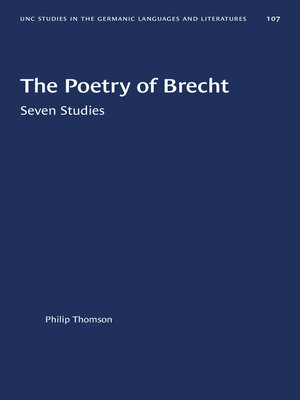The Poetry of Brecht
ebook ∣ Seven Studies · University of North Carolina Studies in Germanic Languages and Literature
By Philip Thomson

Sign up to save your library
With an OverDrive account, you can save your favorite libraries for at-a-glance information about availability. Find out more about OverDrive accounts.
Find this title in Libby, the library reading app by OverDrive.



Search for a digital library with this title
Title found at these libraries:
| Library Name | Distance |
|---|---|
| Loading... |
Though not a survey of Bertolt Brecht’s poetry, this book covers the major periods in his work and most of its major themes as well. Each of the seven chapters deals with a segment from Brecht’s considerably poetic opus. A central characteristic of Brecht’s poetry is its dual function, as self-revelation and self-concealment. This emerges most clearly in the poet’s relationship to his reader for whom Brecht dons a variety of guises, plays a variety of roles, and speaks in a variety of voices.
Thomson’s methodology is pluralist, although he includes a discussion of how reader-response theory can be harnessed to the task of interpreting Brecht’s poetry. Various means of interpretation and analysis are used, depending on which seems to yield the most information and insight. The only reading of Brecht’s poetry categorically refused is the one that accepts it at face value as a record of Brecht’s life experience. Despite outward appearances, Brecht is a devious writer, and nowhere more so than in his poetry, where he most immediately presents himself to his public.
Thomson’s methodology is pluralist, although he includes a discussion of how reader-response theory can be harnessed to the task of interpreting Brecht’s poetry. Various means of interpretation and analysis are used, depending on which seems to yield the most information and insight. The only reading of Brecht’s poetry categorically refused is the one that accepts it at face value as a record of Brecht’s life experience. Despite outward appearances, Brecht is a devious writer, and nowhere more so than in his poetry, where he most immediately presents himself to his public.







